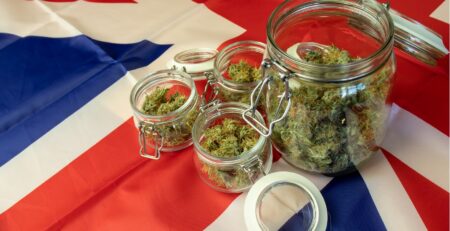CBD Tolerance: Can You Build a Tolerance to CBD?
Can you build a Tolerance to CBD?
Cannabidiol (CBD) is fast becoming a firm favourite in most health-conscious folks repertoire, with more and more people consuming it for a variety of different personal reasons.
The amount of CBD required to experience a certain effect may vary massively from person to person – but does a person have to increase the amount of CBD they consume over a long period time to experience the same effects?
Anecdotally, the suggestions are mixed. With some people advising that they take the same daily dose for months and months and continue to see consistent effects. Others are not so sure. They suggest that they find they need to gradually increase the dose after a certain amount of time to achieve the same level of benefit. We will look at the current level of scientific understand regarding how CBD affects tolerance over time.
What is Tolerance?
CBD Tolerance is something that has been brought up time and time again. First, let look at a definition for tolerance: –
“The capacity to endure continued subjection to a substance without building resistance or without adverse reactionâ€
In layman terms it is how much a reaction is reduced following continued use of a substance. In context “will my body respond less if I continue to take the same dosage of CBD over timeâ€. It is a set of inherent biological traits that we have in-built from birth. It can occur on many levels within the body and for a variety of reasons, such as: –
- Cellular Tolerance Where the receptors on the surface of the cells in your body become desensitised over time through constant interactions with a substance.
- Metabolic Tolerance This regards the processing of a substance within the body before it reaches the desired site/cell in which it affects.
- Behavioural Tolerance Where you become more competent to a substance due to increased use. It occurs with increased sense of familiarity with a substance.
Therefore, for CBD to cause a tolerance, it must in some way affect one of these pathways. To understand this, we should have a look at how CBD acts when it enters the body, so we can conclude whether it affects any of these pathways.
The Endocannabinoid System
CBD is a cannabinoid that interacts with a system in the human body called the endocannabinoid system (ECS). It is a complex network of receptors located on cells all throughout the body. These receptors can be found in the brain, spine, nerve cells, muscles cells and on organs. The system isnt just unique to humans and can be found throughout all mammals and most animals down to the most primitive of sea life.
In the human body it consists of two main subgroups of receptors, called CB1 and CB2. These receptors are responsible for binding different cannabinoids in different ways in order to elicit certain effects on the human body. CBD has a unique way in which it reacts with these receptors which set it apart from other cannabinoids.
The ECS and its Tolerance with CBD
Most cannabinoids, such as THC, will bind to the CB1 receptor, if not fully then at least partially. This makes them agonists for the CB1 receptor. However, CBD is a CB1 antagonist, which means that it doesnt bind directly to the receptor, but still changes the way in the receptor functions to elicit an effect.
Therefore, the action of direct binding of the other cannabinoids to the CB1 receptor causes this receptor to become desensitised to their action. Anybody who has consumed THC over time will confirm that the effects are diminished after a certain period and will need more to respond similarly. This evidence is backed by scientific fact and is an example of cellular tolerance as previously mentioned. CBD, on the other hand, would not exhibit this cellular tolerance as it does not directly bind.
Furthermore, CBD doesnt cause any strong psychoactive effects in the same way the THC does. A user would describe the feeling of THC as a feeling of stoned or high compared to a potential mild relaxation of CBD. It isnt subject to a behavioural tolerance at all. It just isnt applicable to CBD in that way.
So, CBD is only strongly affected by a metabolic tolerance. Which most ingested substances are subject to as the body gets adept at breaking them down. This would then explain how different people respond differently to a specific dose of CBD at any one time as well as reporting different responses to tolerances over a longer period because of their own metabolism.
It also stands to reason that the dosage required for a person will differ for the purposes they are taking it for. If somebody wanted to achieve a specific benefit, then that certain benefit will have its own tolerance loop of how the body naturally processes CBD to achieve relief. Hence why it is always good practice to speak to a medical professional before using any substance for a specific purpose.
CBD Tolerance – Final Comments
The answer to the question of whether CBD causes a tolerance is, that it is possible. The onus is always on you as the consumer of any substance (including any health foods, prescription medicines, remedies etc…) to monitor the effects it causes and to change your dosage accordingly.
[button title=”What are the 10 best CBD Brands in the UK” link=”/cbd-oil-reviews/the-10-best-cbd-oil-brands-in-the-uk” target=”” align=”” icon=”” icon_position=”” color=”#ffcc00″ background_color=”#ffcc00″ font_color=”” size=”2″ full_width=”” class=”button1″ download=”” rel=”” onclick=””][button title=”The Beginners Guide to CBD” link=”/learn/beginners-guide-to-everything-cbd” target=”” align=”” icon=”” icon_position=”” color=”#ffcc00″ background_color=”#ffcc00″ font_color=”” size=”2″ full_width=”” class=”button1″ download=”” rel=”” onclick=””][button title=”The Journey of CBD from Seed to Shelf” link=”/learn/the-journey-of-cbd-from-seed-to-shelf” target=”” align=”” icon=”” icon_position=”” color=”#ffcc00″ background_color=”#ffcc00″ font_color=”” size=”2″ full_width=”” class=”button1″ download=”” rel=”” onclick=””]





